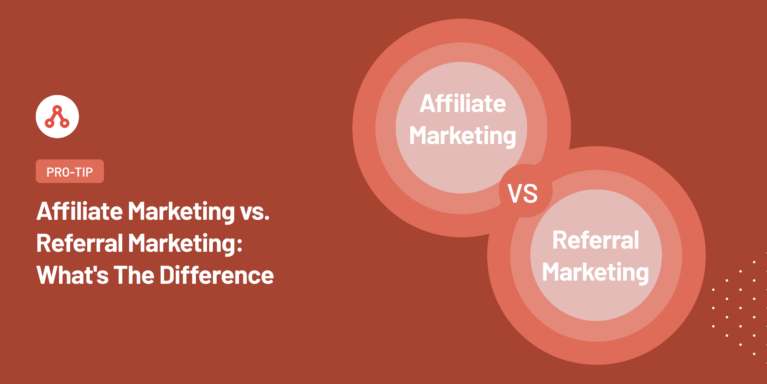
New in RewardsWP: Points, Redesigned Rewards Widget & More
RewardsWP now includes Points, a redesigned Rewards Widget, and new tools to launch, run, and measure loyalty and referrals in one place.
Continue Reading →
RewardsWP now includes Points, a redesigned Rewards Widget, and new tools to launch, run, and measure loyalty and referrals in one place.
Continue Reading →
Most marketers confuse affiliate marketing with referral marketing. And it’s costing them sales.
Though they seem similar, they are fundamentally different strategies.
In this guide, we’ll break down the fundamental differences between affiliate and referral marketing, explore their unique advantages, and help you determine which approach best suits your business needs.
Let’s get started!
In This Guide
Affiliate marketing is a performance-based strategy where businesses pay people (affiliates) to promote their products. The affiliate gets a commission every time someone makes a purchase through their unique tracking affiliate link.
Well, how does it work?
You (the business) provide affiliates with affiliate links. They share these links on their blogs, social media, or websites. When someone clicks that link and buys your product, the affiliate earns a predetermined commission, typically a percentage of the sale.
Let’s look at a real example.

Say you sell a $100 digital course. Sarah, a blogger in your niche, signs up as your affiliate. You set a 30% commission rate and give her an affiliate link. She writes a blog post reviewing your course and includes her affiliate link.
When her reader Tom clicks the link and buys your course, Sarah automatically earns $30, while you make $70.
Referral marketing is when your existing customers recommend your product to their friends and family in exchange for rewards. It’s word-of-mouth marketing, but with incentives to encourage people to share.
Here’s how it works. Your customer loves your product and shares their unique referral link with a friend. When that friend makes a purchase, both your existing customer and their friend get a reward (discount, store credit, or free product).
For example, Dropbox’s referral program gives users 16 GB of extra storage space for every friend they bring in.

Sarah uses Dropbox and loves it. She sends her referral link to her best friend Tom. When Tom signs up, both Sarah and Tom get 16 GB of bonus storage.
Sarah is happy to share because she gets something valuable, and Tom joins because he trusts Sarah’s recommendation.
Now comes the final question, what’s the difference between affiliate marketing and referral marketing.
The core difference is who does the promoting. Affiliates are professional marketers. Referrers are your happy customers.
Affiliate marketing is strictly business. The affiliate promotes your product to make money. They might never have used your product themselves.
Referral marketing is personal. Your customers tell friends because they genuinely like your product. The reward is just a bonus.
Still confused? Understand it this way. Affiliates reach thousands through content marketing and ads. Your customers reach dozens through personal messages and conversations.
The relationships are different too. Affiliates focus on convincing strangers to buy. Referrers share with people (friends, neighbors, family, colleagues) who already trust them.
Money matters differently in each:
Though you might guess the answer would be a straight “it depends,” but it’s not. Because it’s not about choosing one over the other. Smart businesses often use both to maximize their growth potential.
Think of it like having two different sales teams. Your affiliates reach new audiences at scale, while your customers bring in high-quality leads through personal recommendations.
GetResponse is a perfect example of this dual strategy:


And you can do it too for your business.
For starters, start with a referral program to leverage your existing customer base, and then add an affiliate program when you’re ready to scale.
Yes, absolutely. Affiliate agreements need detailed marketing guidelines, FTC disclosure requirements, and commission terms. Referral programs need simpler terms focusing on reward eligibility and customer privacy protections.
Affiliate programs typically cost more in absolute dollars due to higher commission rates and volume. However, referral programs often have a higher cost per acquisition because you’re rewarding both parties.
Set clear boundaries. Make your affiliate program public but limit referral rewards to existing customers only. Use different reward structures – cash commissions for affiliates, product credits for referrals. This keeps each program focused on its strength.
Start with referrals if you have happy customers but limited marketing budget. Begin with affiliates if you have marketing budget and need rapid growth.
The costs vary based on your business model and how you structure each program. Affiliate programs involve commission payouts based on sales volume, while referral programs mean rewarding both customers and their friends. Neither is inherently pricier.
Loved our guide? Do not forget to follow us on Facebook and Twitter for more free affiliate marketing tutorials and guides.
Disclosure: Our content is reader-supported. This means if you click on some of our links, then we may earn a commission. We only recommend products that we believe will add value to our readers.
Launch your affiliate program today and unlock a new revenue channel to grow your business faster.
We use cookies to improve your experience on our site. By using our site, you consent to cookies.
Manage your cookie preferences below:
Essential cookies enable basic functions and are necessary for the proper function of the website.
Statistics cookies collect information anonymously. This information helps us understand how visitors use our website.
Marketing cookies are used to follow visitors to websites. The intention is to show ads that are relevant and engaging to the individual user.